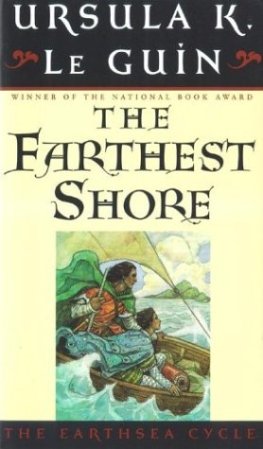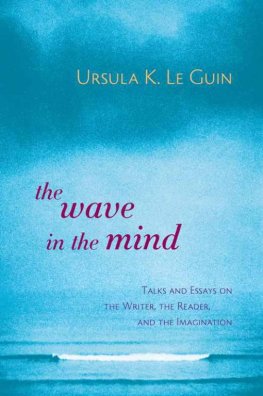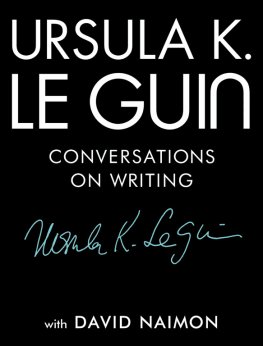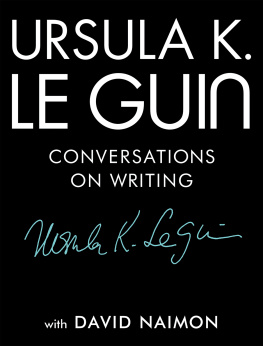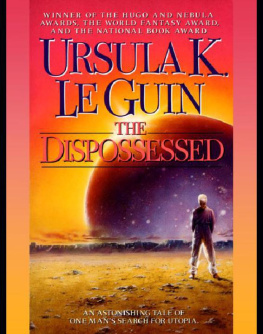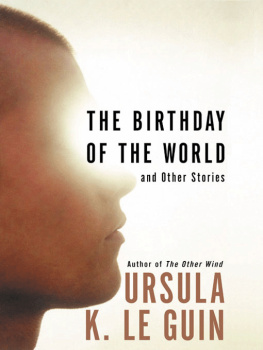Ursula Le Guin - The Field of Vision
Here you can read online Ursula Le Guin - The Field of Vision full text of the book (entire story) in english for free. Download pdf and epub, get meaning, cover and reviews about this ebook. genre: Science fiction. Description of the work, (preface) as well as reviews are available. Best literature library LitArk.com created for fans of good reading and offers a wide selection of genres:
Romance novel
Science fiction
Adventure
Detective
Science
History
Home and family
Prose
Art
Politics
Computer
Non-fiction
Religion
Business
Children
Humor
Choose a favorite category and find really read worthwhile books. Enjoy immersion in the world of imagination, feel the emotions of the characters or learn something new for yourself, make an fascinating discovery.

- Book:The Field of Vision
- Author:
- Genre:
- Rating:3 / 5
- Favourites:Add to favourites
- Your mark:
- 60
- 1
- 2
- 3
- 4
- 5
The Field of Vision: summary, description and annotation
We offer to read an annotation, description, summary or preface (depends on what the author of the book "The Field of Vision" wrote himself). If you haven't found the necessary information about the book — write in the comments, we will try to find it.
The Field of Vision — read online for free the complete book (whole text) full work
Below is the text of the book, divided by pages. System saving the place of the last page read, allows you to conveniently read the book "The Field of Vision" online for free, without having to search again every time where you left off. Put a bookmark, and you can go to the page where you finished reading at any time.
Font size:
Interval:
Bookmark:
Ursula Le Guin
The Field of Vision
I saw Eternity the other night. Like a great Ring of pure and endless light...
Henry Vaughan, 1621-1695Reports from Psyche XIV came in regularly, all routine, until just before their return window opened. Then all at once Commander Rogers radioed that they had left surface, had rejoined the ship, and were commencing departure procedures82 hours 18 minutes early. Houston of course demanded explanations, but Psyches answers were erratic. The 220-second answer lag didnt help. Psyche kept breaking contact. Once Rogers said, We have got to bring her home now if were going to do it at all, apparently in answer to Houstons questions, but the next thing was Hughes asking for a reading, and then something about a dosage. The sun was noisy and reception was very bad. The voice transmission ceased without sign-off.
The automatic information feed from the ship continued. Departure was normal. Normal, reports came in during the twenty-six days of flight which the astronauts spent in drugged sleep on HKL and I.V. hookups. There was no medical monitor on Psyche missions. The only link with the crew was voice contact. When they did not call in on Day 2, the long tension at Houston tightened to despair.
The onboard automatics, directed by the ground crew, had just about established Psyches re-entry course when the dead speakers suddenly said in Hughess voice, Houston, can you give me readings. Optical interference here. They tried to direct him, but the one attempt he made at a manual correction was disastrous, and took ground control five hours to compensate. They told him hands off, theyd bring in the ship. Almost immediately after that they lost voice contact again.
The great pale parachutes opened above the grey Pacific, roses slowly falling out of heaven. The speed-burnt ship screamed steam, plunging; popped back up and rocked, quiet, on the long deep swells. Ground control had done a beautiful job. She was down within a half-kilo of the California. Helicopters hovered, rafts assembled, the ship was stabilized, the hatch was opened. Nobody scrambled out.
They went in and brought them out.
Commander Rogers was in his flight seat, still strapped down and plugged into the HKL and I.V.s. He had been dead about ten days, and it was clear why the others had not opened his suit.
Captain Temski seemed physically unhurt, but dazed and bewildered. He did not speak, or respond to instructions. They had to manhandle him to haul him out of the ship, though he put up no active resistance.
Dr Hughes was in a state of collapse, but fully conscious; he appeared to be blind.
Please...
Can you see anything?
Yes! Please let me have the blindfold.
Do you see this light Im showing? What color is it, Dr Hughes?
All colors, white, its too bright.
Will you point towards it, please?
Its everywhere. Its too bright.
The rooms quite dark, Dr Hughes. Now, will you open your eyes again, please.
It isnt dark.
Mmmh. Possible supersensitivity here. All right now, how about that? Dark enough for you?
Make it dark!
No, keep your hands down, please. Take it easy. All right, well put the compresses back on.
The struggling man relaxed as soon as his eyes were covered, and lay still, breathing hard. His narrow face, framed in a months growth of dark beard, was oiled with sweat. Im sorry, he said.
Well try again later on when youve rested.
Will you open your eyes, please. The rooms quite dark.
Why do you tell me that when its not dark?
Dr Hughes, I can hardly make out your face; Ive got the faintest red illumination on my scopenothing else. Can you see me?
No! I cant see for the light!
The doctor increased the illumination until he could see Hughess face, the clenched jaw, the open, dazzled, frightened eyes.
There, does that make it any darker? he asked with the sarcasm of helplessness.
No! Hughes shut his eyes; he had gone dead white. Get dizzy, he muttered, the whirling, then he gasped for breath and began to vomit.
Hughes was unmarried and had no immediate kin. His closest friend was known to be Bernard Decelis. They had trained together; Decelis had been specialist on Psyche XII, the mission that had discovered the City of Mars, as Hughes was on XIV. They flew Decelis to the debriefing station in Pasadena and instructed him to go in and talk with his friend. The conversation was of course recorded.
D. Hullo, Gerry. Decelis.
H. Barnie?
D. How you doing?
H. Fine. You been OK?
D. Sure. No picnic, was it?
H. Hows Gloria?
D. Fine, just fine.
H. She got past Aunt Rhody yet?
D. [laughs] Oh, Christ, yeah. She can play Greensleeves now.
At least she calls it Greensleeves. H. What have they got you in this dump for? D. To see you.
H. Wish I could return the compliment.
D. You will. Listen. Ive been assured by three different oculists, or whatever the hell they are, opthamollywhoggers, eye-doctors here, that there is absolutely nothing wrong with your eyes. Three opthamacadamizers and a neurologist, in fact. Its a sort of chorus they have. But they sure as hell seem sure of it.
H. So whats wrong is my brain, evidently.
D. In the sense of a crossed connection, maybe.
H. What about Joe Temski?
D. I dont know. Havent seen him.
H. What did they tell you about him?
D. They didnt have a chorus line worked out for him. Just said hes inclined to be withdrawn.
H. Withdrawn! Jesus, Ill say so. Like a rock is withdrawn.
D. Temski? That joker?
H. It started with him.
D. What did?
H. At the site. He stopped answering. D. What happened?
H. Just that. He stopped answering. Stopped talking. Stopped noticing. Dwight thought it was cafard. Is that what theyre still calling it?
D. Its mentioned as one possibility. Was there anything special happened, there at the site?
H. We found the room.
D. The room, yeah. That all came back on your reports. Ive seen them, and some of the holos you brought back with you. Fantastic. What the hell is it, Gerry?
H. I dont know.
D. Is it a construct?
H. I dont know. Whats the whole City?
D. It was built, made; it must have been.
H. How do you know, how can you tell, when you dont know what made it? Is a seashell made? If you didnt know, if you didnt have any background and couldnt assume any likeness, and you looked at a seashell and a ceramic ashtray, could you tell, could you say which was made? And what for? What does it mean? Or what about a ceramic seashell? Or a paperwasps nest? Or a geode?
D. Yeah, OK. But what about those things, that...
arrangement that you call pigeonholes in the reports? I saw the holos. What did you make of them?
H. What did you make of them?
D. I dont know. Theyre weird. I thought of running the spatial arrangements through a computer, looking for meaningful pattern... You dont think much of that.
H. No. Fine. Only what are you going to program for meaning?
D. Mathematical relationships. Any kind of geometrical pattern, regularity, code. I dont know. What was the place like, Gerry?
H. I dont know.
D. You were in there a lot?
H. All the time, after we found it.
D. Thats where you noticed this kind of eye trouble youve got? How did it start?
H. Things going out of focus. Like eye strain. It was worse outside the room. Came on over several days. I could still make things out all right when we were taking the ML up to the ship. But getting worse. Thered be these flashes of light, left my depth perception all screwed up, Id get dizzy. Dwight and I set up the course, one or the other of us was functioning most of the time. But he was getting kind of wild. Didnt want to use the radio, wouldnt touch the onboard computer.
Font size:
Interval:
Bookmark:
Similar books «The Field of Vision»
Look at similar books to The Field of Vision. We have selected literature similar in name and meaning in the hope of providing readers with more options to find new, interesting, not yet read works.
Discussion, reviews of the book The Field of Vision and just readers' own opinions. Leave your comments, write what you think about the work, its meaning or the main characters. Specify what exactly you liked and what you didn't like, and why you think so.

